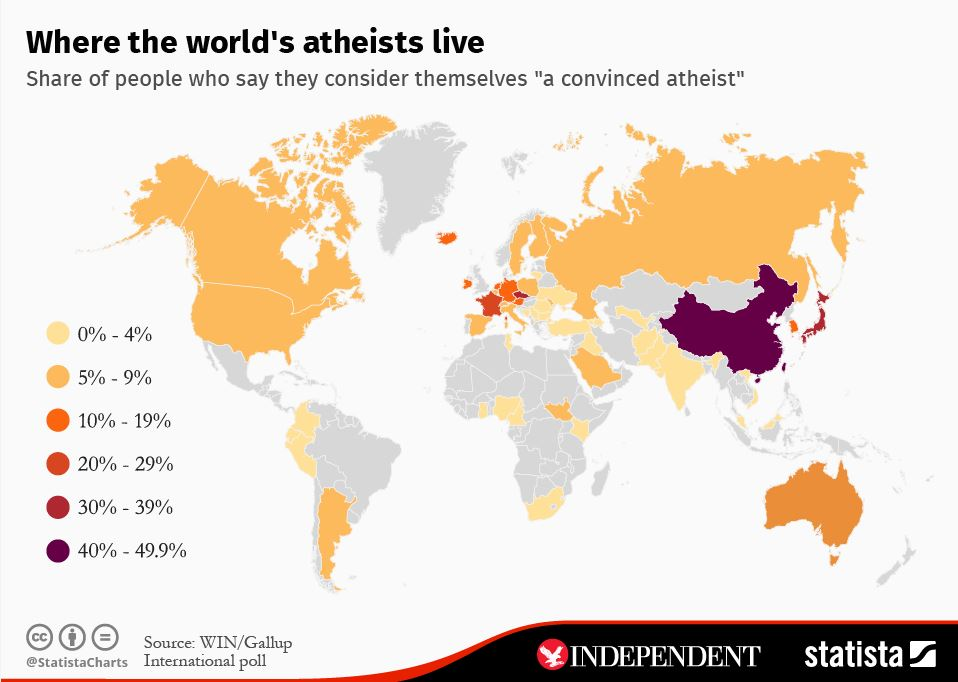Answering “Is God real?” from a Biblical perspective. No surprise the Bible addresses atheism – though not in very complimentary terms.
Short Answer
Yes, God is real. The God of the Bible assigns moral blame for those who deny his existence because he is plain to everyone. But because of sin, atheists will not see the truth, become darkened in their understanding, and are deluded.
Long Answer
Not everyone believes in God. In 2015, the Oxford Handbook of Atheism’s survey counted approximately 450-500 million non-believers in God worldwide. The survey counted “atheists” as both atheists and agnostics (those unsure about God’s existence). The percentage of atheists in any given country varied greatly. In the United States, 8% of the population is atheist which closely mirrors the global percentage of atheists (7%).

Image credit: Independent.co.uk
Although it does not enjoy broad popular appeal, atheism has tremendous influence in the Western world. From academia to Hollywood, atheism has become a default “religion” (aka secular humanism or secularism) in America since the mid-20th century in terms of cultural influence. With so many atheism entrenched in our culture, it makes sense why someone would ask the question, “is God real?”
In this post I aim answer the question “is God real?” from a Biblical perspective. It should come as no surprise the Bible addresses atheism though not in very complimentary terms.
Atheism: The Fool’s Worldview
Atheism wasn’t respected much in ancient Israel.. Consequently, the Bible is not neutral toward atheism. According to Scripture, God demonstrated his existence so plainly that he held those morally culpable who denied it.
According to Scripture, atheism is the most foolish worldview on the planet. The Psalmist declared, “the fool says in his heart, ‘there is no God.’” (Psalm 14:1, Psalm 53:1).
To be fair to the Old Testament context, nabal (נָבָל), the Hebrew word for ‘fool’ in question, doesn’t translate directly to our English word “fool”. Instead, it relates to a lifestyle tied to a certain theology. As GotQuestions.org says, “nabal”…
“often refers to an impious person who has no perception of ethical or religious truth. The meaning of the text is not ‘unintelligent people do not believe in God.’ Rather, the meaning of the text is ‘sinful people do not believe in God.’”
The Bible isn’t name-calling or saying anyone who doesn’t believe in God is stupid. On the contrary, these verses imply anyone who doesn’t believe in God has immoral motives for doing so. Atheists deny the God of Scripture because that atheistic philosophy fits better with their lifestyle. In short, atheists don’t want to be accountable for their sins.
Image credit: GodAndScience.org
This doesn’t mean that all atheists live what we would term “immoral” lives. Some atheists may even live morally superior lives compared to some professing Christians. But the philosophical justification for traditional morality is sorely lacking in atheism. Try as they might, atheists cannot ground transcendent morality without a transcendent lawgiver. Or as Russian novelist Fyodor Dostoevsky once quipped, “If there is no God, everything is permitted.”
Admittedly, this is a bold claim. To say atheists believe atheism because it fits their life choices might seem like slander. But this is not a matter of personal opinion; it’s an implication from God’s Word. To be an atheist, is to be a Biblical and immoral fool.
“The fool says in his heart, ‘There is no God.’” (Psalm 14:1)
The Bible: God is Obvious, Sometimes
But the problem is God is not always so obvious. When famed atheist Bertrand Russell was asked what he would say to God if he ever met him replied, “Sir, why did you take such pains to hide yourself?”
Philosophers describe this problem as the ‘Hiddenness of God’. That is if God exists, he seems to be making himself difficult to find. The Bible also acknowledges this phenomena. “It is the glory of God to conceal things, but the glory of kings is to search things out.” (Proverbs 25:2). Sometimes God is not as apparent as we would like. After all, we can call our friend and have lunch with her so we believe in her existence. But we don’t have God’s phone number.
So God is hidden in one sense. He does not make himself known to us in the way that friends may be known. It is part of the Creator’s nature to not relate to his creatures as creatures relate to each other. The reason? God is holy (1 Samuel 2:2). He’s not like us. We shouldn’t expect him to reveal himself in the same way that others reveal themselves to us. This part is not confusing for those familiar with the biblical God.
The problem with the atheistic worldview is that take the ‘inch’ of God’s hiddenness and expand it into a ‘mile’ of his non-existence. In the minds of atheists and agnostics, God’s hiddenness devolves into his non-existence – or at least his non-disclosure. What begins with a seemingly innocent question (why is God not more obvious), turns into a creed (God doesn’t exist). When taught in confident tones from university lecterns, atheism carries an air of sophistication. And atheists can be the most boisterous evangelists on campus.
But the Apostle Paul was not persuaded by such babble.
Image credit: GodNeighbor.WordPress.com
The Apostle Paul: God is Plain to Everyone
In Romans 1:19, Paul wrote, “what can be known about God is plain to them, because God has shown it to them”. The Apostle then claims God’s power, nature, and obviousness in creation is so apparent that no one has an excuse for not knowing God – including Bertrand Russell.
In other words, the Bible presents God as painfully obvious.
But atheists cannot see God in the same way Christians can. Paul later wrote “They are darkened in their understanding, alienated from the life of God because of the ignorance that is in them, due to their hardness of heart.” (Ephesian 4:18). So although God is plain to the atheist, his understanding is weak because of a hard heart.
So the issue is not a lack of evidence in God. Everyone has plenty of information about God (Psalm 19:1-4 and references below). And people cannot see God because of hardness and sin. So atheists are atheists despite evidence to the contrary and because of their rebellion against God.
If this is true, then every atheist is deluded. Much like the criminal who never finds a policeman, atheists never find God for fear of what he would do to them. According to the New Testament, atheists don’t believe in God because they don’t want to believe in God because they want to stay in their sin.
Or as Evangelist Ray Comfort likes to say, “God doesn’t believe in atheists.”
“For the wrath of God is revealed from heaven against all ungodliness and unrighteousness of men, who by their unrighteousness suppress the truth. For what can be known about God is plain to them, because God has shown it to them. For his invisible attributes, namely, his eternal power and divine nature, have been clearly perceived, ever since the creation of the world, in the things that have been made. So they are without excuse. For although they knew God, they did not honor him as God or give thanks to him, but they became futile in their thinking, and their foolish hearts were darkened.” (Romans 1:18-21)
Conclusion: The God Who Exists Is The God Who Saves
Image credit: CreatorCreatedCreation.com
The Bible is clear about atheism and it is also clear about how to leave atheism. Through Scripture, God has shown himself to be the creator and sustainer of the universe (Genesis 1:1, Colossians 1:17).
This same God who exists is the same God who saves (John 3:16).
“For God so loved the world, that he gave his only Son, that whoever believes in him should not perish but have eternal life.” (John 3:16)
Two thousand years ago, God stepped down to earth to become a man. He walked along the first century roads in the Roman province of Palestine, preached the gospel, gathered disciples to himself, and was ultimately arrested by the religious authorities. This God or Jesus the Christ was crucified on a cross, buried in a borrowed tomb, and rose from the dead three days later to prove he was divine. Then he ascended to his Father in the power of the Holy Spirit 40 days after his resurrection (Acts 1:9, 1 Corinthians 15:3-5).
Whoever believes in this God and turns from their sins – even the sin of atheism – will be saved. As the Scripture says, “Repent therefore, and turn back, that your sins may be blotted out.” (Acts 3:19)
If you are reading this, there is still time to turn. Don’t delay. Atheism is a bankrupt and foolish philosophy. Follow Christ today.
References
- Ken Ham (Video: 2:43): Is God Real?
- Brandon Clay: Existence of God: 31 Reasons To Believe In The God of the Bible
- William Lane Craig: Does God Exist?
- Matt Slick: The Transcendental Argument for the Existence of God



